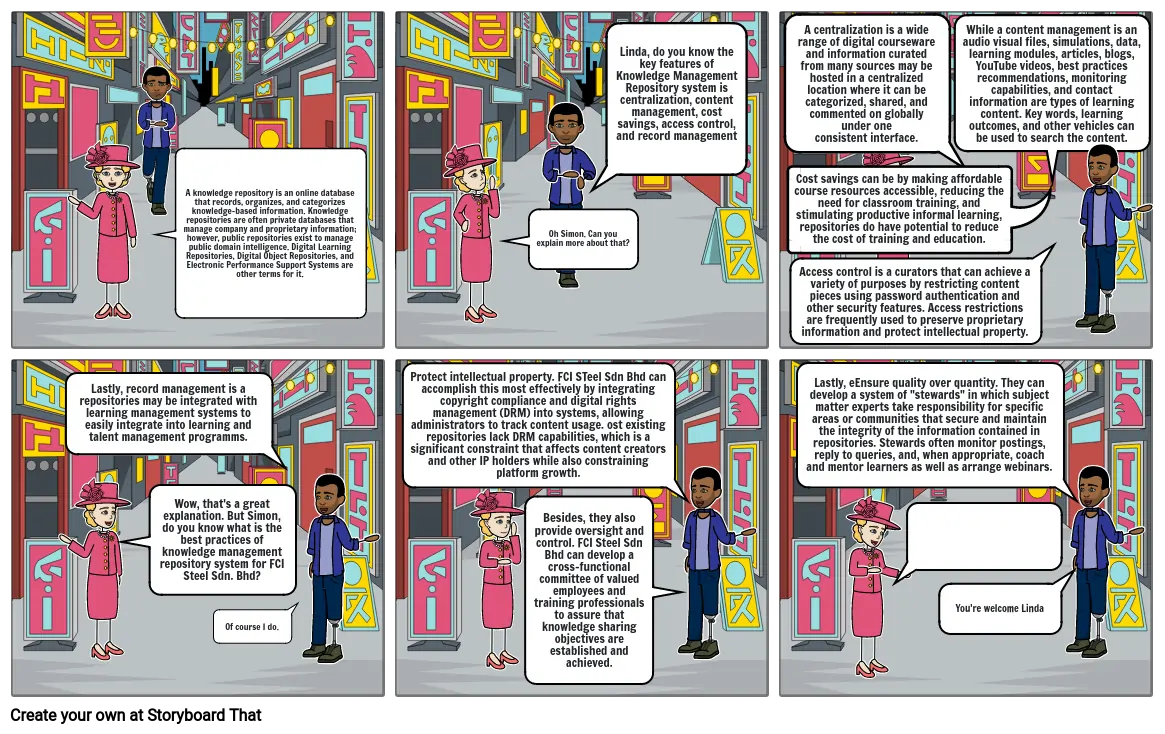FCI Steel Sdn bhd (KM Repository System)

Siužetinės Linijos Tekstas
-
- A knowledge repository is an online database that records, organizes, and categorizes knowledge-based information. Knowledge repositories are often private databases that manage company and proprietary information; however, public repositories exist to manage public domain intelligence. Digital Learning Repositories, Digital Object Repositories, and Electronic Performance Support Systems are other terms for it.
- Oh Simon. Can you explain more about that?
- Linda, do you know the key features of Knowledge Management Repository system is centralization, content management, cost savings, access control, and record management
- A centralization is a wide range of digital courseware and information curated from many sources may be hosted in a centralized location where it can be categorized, shared, and commented on globally under one consistent interface.
- Access control is a curators that can achieve a variety of purposes by restricting content pieces using password authentication and other security features. Access restrictions are frequently used to preserve proprietary information and protect intellectual property.
- While a content management is an audio visual files, simulations, data, learning modules, articles, blogs, YouTube videos, best practices recommendations, monitoring capabilities, and contact information are types of learning content. Key words, learning outcomes, and other vehicles can be used to search the content.
- Cost savings can be by making affordable course resources accessible, reducing the need for classroom training, and stimulating productive informal learning, repositories do have potential to reduce the cost of training and education.
- Lastly, record management is a repositories may be integrated with learning management systems to easily integrate into learning and talent management programms.
- Wow, that's a great explanation. But Simon, do you know what is the best practices of knowledge management repository system for FCI Steel Sdn. Bhd?
- Of course I do.
- Protect intellectual property. FCI STeel Sdn Bhd can accomplish this most effectively by integrating copyright compliance and digital rights management (DRM) into systems, allowing administrators to track content usage. ost existing repositories lack DRM capabilities, which is a significant constraint that affects content creators and other IP holders while also constraining platform growth.
- Besides, they also provide oversight and control. FCI Steel Sdn Bhd can develop a cross-functional committee of valued employees and training professionals to assure that knowledge sharing objectives are established and achieved.
- Lastly, eEnsure quality over quantity. They can develop a system of "stewards" in which subject matter experts take responsibility for specific areas or communities that secure and maintain the integrity of the information contained in repositories. Stewards often monitor postings, reply to queries, and, when appropriate, coach and mentor learners as well as arrange webinars.
- Wow, That's a lot of things that I have learned today from you Simon. Thank you for the information.
- You're welcome Linda
Sukurta daugiau nei 30 milijonų siužetinių lentelių

